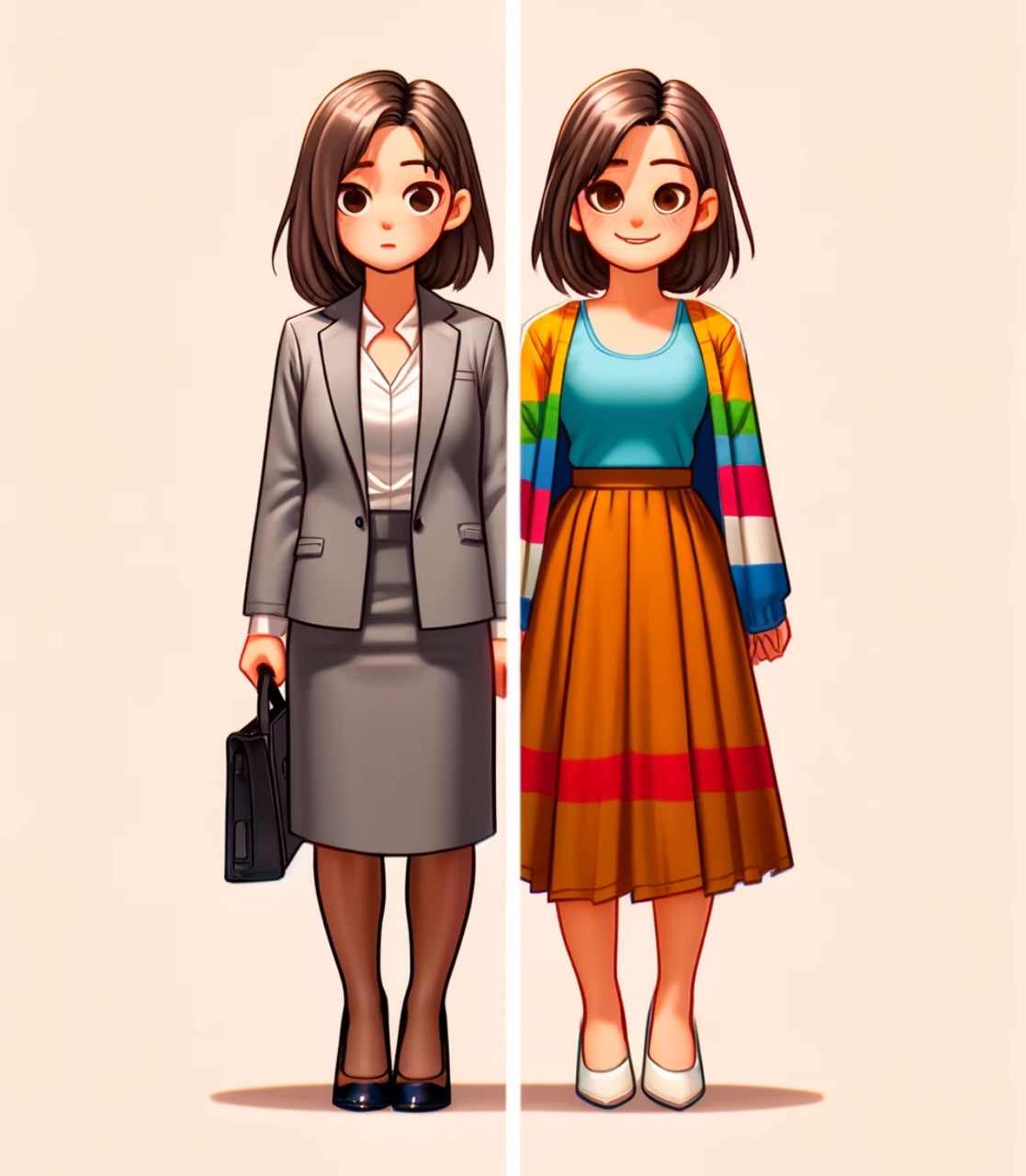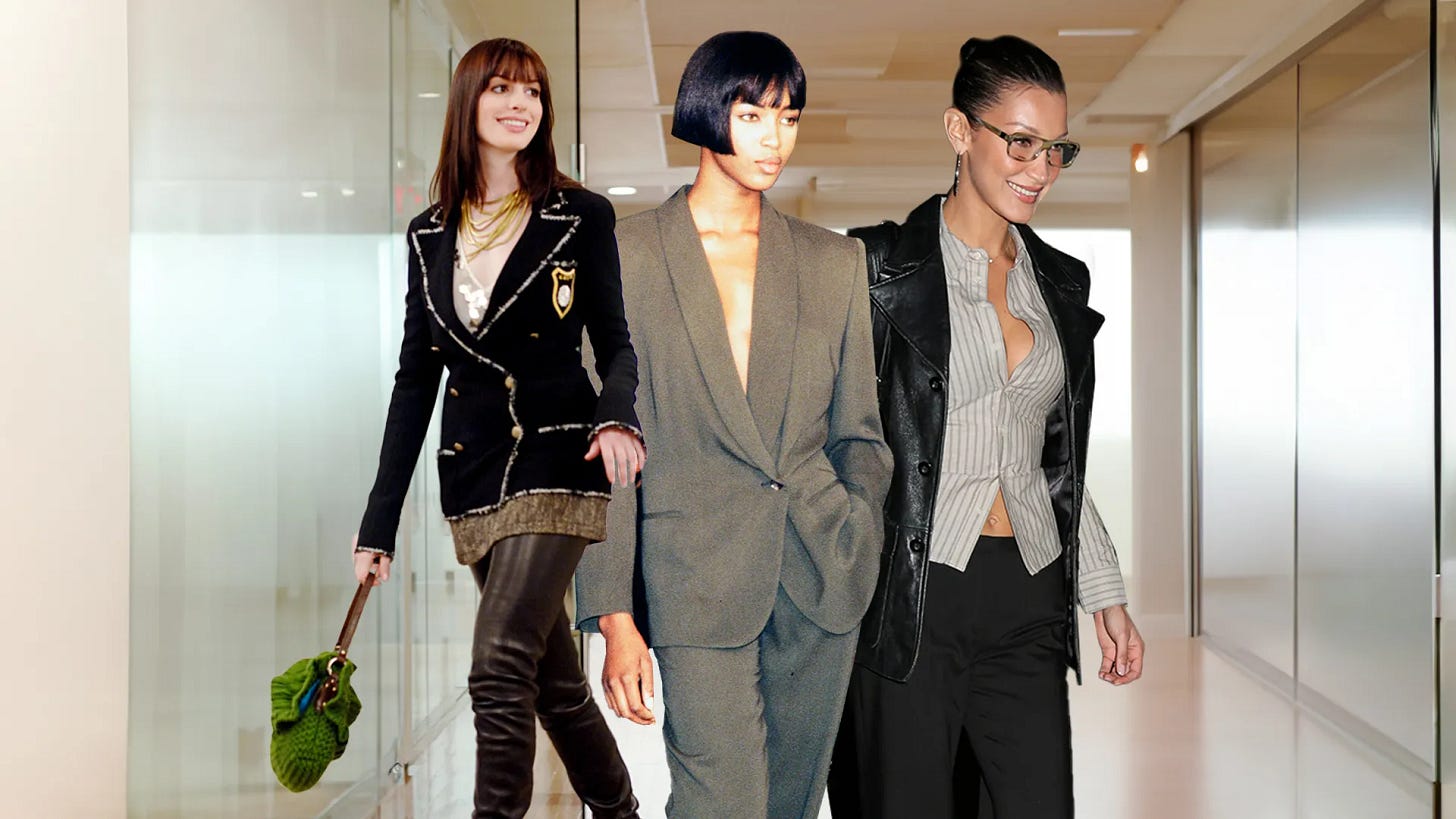"Office" Fashion Has to Go
Go ahead, wear the crop top.
I really hate workwear. I promise I didn’t steal this opinion off of famed Twitter fashion legend @dieworkwear, although I do agree with him.
We, as a society, have moved past workwear and office dress codes.
I came to this conclusion after a follower of mine asked my thoughts on “Corporate Crop Tops.” I enjoy a good crop top myself, and have worn a couple to the office, back when I had an office job, although they were typically of the boxier, less sexy variety. My first thought was, “Well, of course a crop top should be OK to wear to the office, but a lot of stuffed shirts would disagree,” followed by “Well, we would need to reexamine the dress code” followed by “Wait? It’s 2024, why do we even have office dress codes? Why do we even have offices?”
Now hold up- that’s not to say that everyone should go into their office dressed like they’re going to Coachella, but honestly…have you ever been to a grocery store, a subway, or…any other public setting? That is not how 99% of people choose to dress. If anything, your average person could stand to add some flair into their olive green utility jacket and straight-leg jeans uniform. I firmly believe that if we got rid of the concept of “workwear” or an “office dress code,” people wouldn’t really dress all that differently than they do now, at least as far as appropriateness goes. The difference is that they would be wearing clothes that they bought for the sake of comfort and/or enjoyment, not duty.
Now, if society (and fashion standards) were based completely around what I personally like, your average Tuesday would look a whole lot more like the few hours after church service on Easter, with everyone in pastel fancy clothes. I like dresses and suits, and I’m kinda formal and traditional. But there’s also some beauty to seeing different types of people dressing the way they want, even if I don’t share their style. It’s one reason I like to watch those “NYC Fashion Students” videos, even though there’s basically a 1% chance that I personally like any of the outfits featured.
Back when I worked in an office, we didn’t really have much of a dress code so I had fun with my version of workwear. I kind of enjoyed the challenge of putting together something interesting for my big fancy office job (I worked in tech, so nobody else dressed remotely like me.) But I would have had an absolutely miserable time if my workwear consisted of office-appropriate beige slacks:
Now, you may be wondering, how do we allow people to wear whatever they want without men getting distracted by all the hot women, bodies no longer shrouded in Ann Taylor LOFT? To this I have two points:
I actually don’t think most women would choose to wear sexy clothes to an office, even in the complete absence of a dress code. Again: are women wearing sexy clothes to the post office?
Even if they did wear sexy clothes to the office, I don’t think it would be much more distracting than how they currently look- plenty of women describe being sexually harassed even while adhering to a dress code. I don’t think women are the problem here.
I guess my hatred of workwear isn’t only the fact that it’s boring (let’s be real, most people dress boringly, office or not) but rather the fact that it feels absurd to have to buy a separate wardrobe for work, a place where you spend way too much time already. Work is a means to an end, unless you’re lucky enough to be a full-time Substack writer (here’s where I ask you to please subscribe.) If you’re already going to your office to do a job you’re only doing to make an income, why should you also have to spend your own money on a dowdy gray wardrobe that isn’t comfortable, flattering or enjoyable? Have we not given the corporate overlords enough?
Another question you might have is: okay, should people wear pajamas to the office? I’m gonna say: yes, assuming they’d wear those pajamas elsewhere. I can’t say I often see adults wearing fuzzy Spongebob onesies out in public on the weekends, so I can’t imagine they’d wear these to work. Is it possible that slightly more presentable “loungewear” clothes could seep into the workplace? Might we see things like leggings, yoga pants, sweatpants and hoodies? Yes, but if you work in tech, that’s been going on for a while and clearly not causing any kind of havoc. I actually dislike this aesthetic personally, but hey, it’s not about me. And society is trending in this direction anyway, so why cling to the past? Do you really think we’re going to be wearing suits to work in 2050? Of course not; the AI-powered robots will.
Generally, I think people should wear what makes them happy. This is one of the many reasons I think working remotely is good; you’re not restricted by arbitrary and stuffy dress codes. This doesn’t mean I think we should start showing up to weddings or parties in loungewear, because generally getting dressed up is part of the fun for those things and you kind of owe it to the hosts who are providing you with free food and entertainment. Also, cocktail/formal attire is pretty. Workwear is not.
I may change my tune if office across the world become amenable to the office siren aesthetic. But until then, workwear can die.










My day-to-day office attire is sort of an Audrey Hepburn in Funny Face vibe. Lots of turtlenecks, tapered pants, and flats or loafers. It’s not a suit and pumps, but it’s business casual enough that people take me seriously. I like dressing a bit nicer for work than for casual outings. I think it subconsciously puts me in a serious, professional frame of mind. It mentally prepares me for a day of working.
I don’t mind the idea of business dress codes. I don’t think everyone needs to wear a solid gray suit, but a standard business casual dress code allows for personal expression while also showing that the people working in the office respect it enough to not show up looking too informal.
Regarding crop tops in the office - not going to happen for me unless the A/C situation in the office radically changes. It’s too cold at my workplace for short sleeves, let alone a crop top.
I think workwear died about a decade ago with tech and as Zoomers enter the workforce, it will die even further. I don't know that this is a good thing—it seems like one more death blow to decorum in public spaces, one more means of blurring the public/private distinction. But it's inevitable.